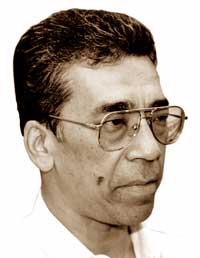 Nepali Times is introducing a quick weekly interview in this space with personalities in the arena of business, finance and trade. This week's guest is Padma Jyoti, of the Jyoti Group of companies. He is a Harvard Business School graduate.
Nepali Times is introducing a quick weekly interview in this space with personalities in the arena of business, finance and trade. This week's guest is Padma Jyoti, of the Jyoti Group of companies. He is a Harvard Business School graduate.
Nepali Times: We have got another three months to hammer out a new Nepal-India trade treaty. What kind of homework do you expect the government to do?
Padma Jyoti: These three new months are a sort of unexpected bonus. Our work should have started about 15 months ago when we started getting signals that this time the treaty renewal would not be smooth sailing. Some of us in FNCCI had sensed this and we did try to do our homework. We got together with our counterpart CII in India and hammered out a set of recommendations for the two governments to consider. But frequent changes in our government and other political priorities overtook us, a vacuum in the decision-making chain created inattention.
The other sad part was that quite a few in Nepal misunderstood the signals and the importance of our effort, even going to the extent of calling some of us in FNCCI of trying to fix something that wasn't broken. They mistakenly had wishful thinking that if we did nothing to the treaty, it would be renewed automatically. When India served notice everyone woke up and jumped into the act, which by the way is not helping matters either.
To be fair, I must say that the present government negotiating team is doing very good and hard work. It is a difficult and highly technical work. We must wish them the best. The next three months can be used to collect facts and grapple a few remaining issues like "surge". I am pleased to see that FNCCI has already started work. In the next three months we should make a concerted, not fragmented, effort.
Do you really think that the five Nepali export items that the Indians are worried about is the real reason for the deadlock? If so, what would Nepali industry lose by being pragmatic and stopping those exports if we can make major gains in other areas?
It is true that these five products triggered the chain of events. Actually, only two seem to be the serious ones. The present political equilibrium in a some Indian states and a new wave of protectionism there have added to the difficulties. The chain of incidents and accidents in the last year or so also have not helped matters, though Nepal was not at fault in most of them.
Yes, there were quite a few people who said let us forget these few products who made money only because of duty differences and go forward with the treaty without them. I do not fully agree with this view. FNCCI has to look after investments already made in the country. Technically speaking, all these products qualify for export. If duties in India come down, they will be in trouble and that is the business risk these investors have taken. But we cannot keep changing a treaty between two countries just because of a few products and a few complaints. Treaties are signed to give stability, continuity and to encourage legal trade and investments. So I think FNCCI took a correct principled stand.
What kind of measures need to be taken to restore business confidence and bring in a spurt of new investments to Nepal?
The one thing uppermost in everyone's mind is how well will our country manage the phase of emergency. It can certainly take temporary care of violence, extortion and extreme measures we unfortunately have come to see in our society in recent times. But if, at the same time, we do not address the deeper issues of mismanagement, sense of alienation and hopelessness felt by a section of our society, we cannot have a peaceful future. We will only be walking a tightrope, not knowing when and where we will fall again. This is not good for business.
We need more discipline in every walk of life including in business. Labour law, company law, even our civic sense all sorely need accountability, rewards based on merit and punishments when needed. For example it is a very sad state of affairs that in a country badly in need of employment creation, no investor today wants to hire more manpower if he can help it. Trade unions and the political parties who control them have to wake up to this reality.
In your opinion, what three most important things the government needs to do to get that process rolling?
Strong leadership, sincere intentions and trustworthy governance are starting points. Political parties must listen to the cry of the people and make themselves relevant. They have to forget about getting votes in the next elections for some time at least. Paradoxically, those who do this will get more votes. How can we make more of our citizens feel involved in the nation building process? This is a question we have to answer.


